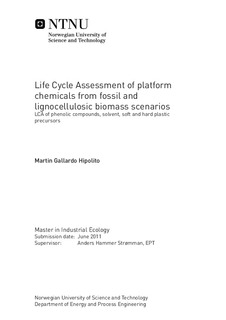Life Cycle Assessment of platform chemicals from fossil and lignocellulosic biomass scenarios: LCA of phenolic compounds, solvent, soft and hard plastic precursors
Master thesis
Permanent lenke
http://hdl.handle.net/11250/234518Utgivelsesdato
2011Metadata
Vis full innførselSamlinger
Sammendrag
One of the challenges of our time is the substitution of the existing fossil based economy by a green economy within the framework of sustainable development of our society. Biomass, especially from lignocelluloses, is a promising solution for the substitution of fuels, energy, chemicals and materials from fossil sources in a so called ―Biorefinery‖. The production of biochemicals presents higher mass and carbon theoretical efficiency, and it seems an interesting alternative to provide a renewable path for globally and widely demanded platform chemicals like phenols, solvents (Acetone), soft plastic precursor (Polyethylene) and hard plastic precursor (Polypropylene).In this report, the environmental loads associated to the production of biochemicals (Phenolic compounds, Acetone, PolyHydroxyButyric Acid and Polylactic Acid) from lignocellulose biomass scenarios (Poplar and Eucalyptus) are evaluated and compared to the petrochemical equivalents. Life Cycle Assessment Methodology and the latest Global Warming Potential Indicator that accounts biogenic greenhouse gas effect related to the rotation period of the feedstock along the entire carbon cycle are used along this study.Biochemicals production could contribute to possible reductions between 37% and 48% on greenhouse gas emissions for the functional unit when taking into account the entire carbon cycle and not only from cradle to gate. Also, up to 80% fossil fuel can be saved while ecotoxicity indicators present much lower values for biochemicals production. PHB seems to be the most environmentally friendly of all the biochemicals, and phenolic compounds the worst. But there are some trade-offs; biochemicals may increase other impact categories such Eutrophication and Acidification, but also Human toxicity, Photochemical Oxidant Formation and Particulate Matter Formation. Last but not least, water depletion is a fundamental issue involved, being substantially higher for biochemicals, even when irrigation of certain wood species may not occur. Decrease of fertilizers and irrigation, new solutions for disposal, treatment and recycling of ash and gypsum, increase of yields and production, energy efficiency techniques and a cleaner electricity mix, could bring the production of biochemicals to an status where they are dramatically better in all impact indicators if all the stakeholders on the life cycle of the biochemicals (Agriculture and Industry sectors, research institutions, policy makers and final customers) get involved.
